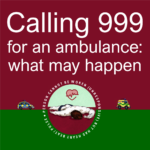Search Result
Calling 999: ambulance call-outs, and the police
Calling 999: what may happen
 Calling an ambulance in an overdose situation can save lives. Ensuring friends get the right medical help if they need it is the top priority. However, there are times when an ambulance is not called because guys are fearful the police will turn up as well which could lead to arrest and investigation.
Calling an ambulance in an overdose situation can save lives. Ensuring friends get the right medical help if they need it is the top priority. However, there are times when an ambulance is not called because guys are fearful the police will turn up as well which could lead to arrest and investigation.
Below we have listed what we understand may happen when 999 is called for an ambulance:
- When someone overdoses on 'G' others around them may let them sleep it off, stay nearby, and/ or administer first aid; eg: place them in the recovery position. (If someone dies as a result of an overdose and this is regarded suspicious then the police will investigate and may make arrests).
- When a 999 is called for an ambulance in an overdose situation, an ambulance will arrive, usually taking the patient to the hospital (A&E).
- The police may also attend and investigate. This may result in arrest and charges1 if the police believe a crime has been committed (eg: possession, intent to supply, sexual assault and rape). This may result in a court appearance and, if convicted, a sentence, with potentially life-changing implications for those concerned.
- There have also been instances where an ambulance has been called, but the party (scene) has been tidied up, and guests have left, before the ambulance and/ or the police have attended. This becomes problematic if the police suspect/ learn a potential crime scene has been contaminated and/ or evidence removed. This could result in arrest and charges, court, and a sentence.
1 If you are charged (eg: with Possession) then you may avoid a conviction (eg: get a Caution), or a prison sentence (get a community sentence, even for Intent to Supply, in some circumstances).
Flow diagram
Click here to view a flow diagram. The diagram is a simplification of a range of scenarios which can be complex with life-changing implications. It is for guidance only. If you or someone else is in trouble, get professional advice at the earliest opportunity. Know your rights when questioned and/ or arrested. Anything you say may be used as evidence against you and others.
↑ Back to top